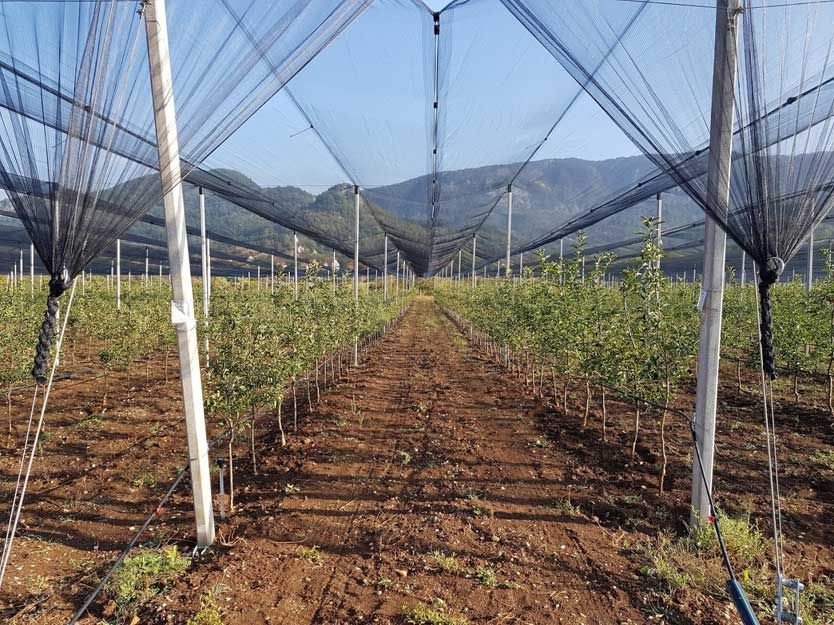
Montenegro is a net importer of agricultural and food products. Although the trade deficit has declined over the last years, research by the EU-funded Institute for Prospective Technological Studies shows that a number of elements still have an impact on this situation. These include fragmented farms, low volumes of primary production, an underdeveloped processing sector, and low levels of the application of modern production technologies.
The potential for growth in the agricultural market was noticed by Veletex, a Montenegrin company which has been operating for 30 years and is engaged in food distribution and retail of horticulture products. The company’s Kalia garden centres employ over 40 agronomists.
“There is no other company or institution in Montenegro that employs so many experts in agriculture. Kalia is also at the source of procurement of all raw materials for agricultural production, which helped”
Miloš Golubović , General Manager of Veletex
Miloš Golubović is the general manager of Veletex. He explains that primary agricultural production was a good match for their business. The distribution sector, which is the oldest sector in the company, deals with the distribution of food, including fruit and vegetables, so the company has business partners and contacts for selling agricultural products. “There is no other company or institution in Montenegro that employs so many experts in agriculture. Kalia is also at the source of procurement of all raw materials for agricultural production, which helped.”
Veletex therefore launched a new company, Naše Voće (“our fruit” in Montenegrin), and purchased over 44 hectares of agricultural land from a formerly state-owned farm in the Nikšić area.
Miloš explains that working with modern technologies in fruit-growing requires larger areas because there is one very expensive piece of infrastructure necessary – regardless of whether you have one hectare or 40 hectares of land. “I mean the central irrigation system.”
Investment in this type of technology is a significant challenge, even for a well-established company such as Veletex. For this reason, Naše Voće decided to apply for support from the EU programme, Instrument for Pre-accession Assistance for Rural Development (IPARD), which focuses on rural areas and the agri-food sectors in countries in the process of joining the EU. Through IPARD, they were supported in establishing and later expanding their apple orchards and investing in anti-hail netting. Now, with the latest call for proposals, they have signed a grant contract for the construction of a facility for processing and storing fruit. “With 2,500 square meters, the facility will be one of the largest in Montenegro,” Miloš says.

Miloš Golubović , General Manager of Veletex“The plan for further expansion is in Red Delicious, but on four hectares there will be a new variety – Japanese Fuji – which is also a red apple: a large fruit, something completely new for Montenegro.”
In addition, they have signed a grant contract for primary production with the construction of an intensive perennial apple orchard. The investment includes purchase of seedlings and a tractor.
Apples are the primary fruit that the company is working on, because of the climatic conditions of the Župa valley which are best for apple growth. Currently, the company grows varieties of red apple. “The plan for further expansion is in Red Delicious, but on four hectares there will be a new variety – Japanese Fuji – which is also a red apple: a large fruit, something completely new for Montenegro,” says Miloš.
About the programme
Part of the Instrument for Pre-accession Assistance (IPA), designed to support reforms in countries in the process of joining the EU, the Instrument for Pre-accession Assistance for Rural Development (IPARD) focuses on rural areas and the agri-food sectors of those countries. Through this tool, the EU provides beneficiaries with financial and technical help for making their agricultural sector and rural areas more sustainable and aligning them with the EU’s common agricultural policy.
Photo credits: Naše Voće
The potential for growth in the agricultural market was noticed by Veletex, a Montenegrin company which has been operating for 30 years and is engaged in food distribution and retail of horticulture products. The company’s Kalia garden centres employ over 40 agronomists.
Miloš Golubović is the general manager of Veletex. He explains that primary agricultural production was a good match for their business. The distribution sector, which is the oldest sector in the company, deals with the distribution of food, including fruit and vegetables, so the company has business partners and contacts for selling agricultural products. “There is no other company or institution in Montenegro that employs so many experts in agriculture. Kalia is also at the source of procurement of all raw materials for agricultural production, which helped.”
Veletex therefore launched a new company, Naše Voće (“our fruit” in Montenegrin), and purchased over 44 hectares of agricultural land from a formerly state-owned farm in the Nikšić area.
Miloš explains that working with modern technologies in fruit-growing requires larger areas because there is one very expensive piece of infrastructure necessary – regardless of whether you have one hectare or 40 hectares of land. “I mean the central irrigation system.”
Investment in this type of technology is a significant challenge, even for a well-established company such as Veletex. For this reason, Naše Voće decided to apply for support from the EU programme, Instrument for Pre-accession Assistance for Rural Development (IPARD), which focuses on rural areas and the agri-food sectors in countries in the process of joining the EU. Through IPARD, they were supported in establishing and later expanding their apple orchards and investing in anti-hail netting. Now, with the latest call for proposals, they have signed a grant contract for the construction of a facility for processing and storing fruit. “With 2,500 square meters, the facility will be one of the largest in Montenegro,” Miloš says.

In addition, they have signed a grant contract for primary production with the construction of an intensive perennial apple orchard. The investment includes purchase of seedlings and a tractor.
Apples are the primary fruit that the company is working on, because of the climatic conditions of the Župa valley which are best for apple growth. Currently, the company grows varieties of red apple. “The plan for further expansion is in Red Delicious, but on four hectares there will be a new variety – Japanese Fuji – which is also a red apple: a large fruit, something completely new for Montenegro,” says Miloš.
About the programme
Part of the Instrument for Pre-accession Assistance (IPA), designed to support reforms in countries in the process of joining the EU, the Instrument for Pre-accession Assistance for Rural Development (IPARD) focuses on rural areas and the agri-food sectors of those countries. Through this tool, the EU provides beneficiaries with financial and technical help for making their agricultural sector and rural areas more sustainable and aligning them with the EU’s common agricultural policy.
Photo credits: Naše Voće
Please wait while your video is being uploaded...
Don't close this window!